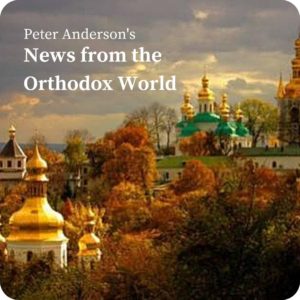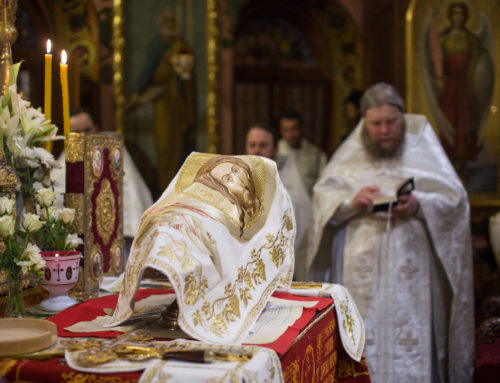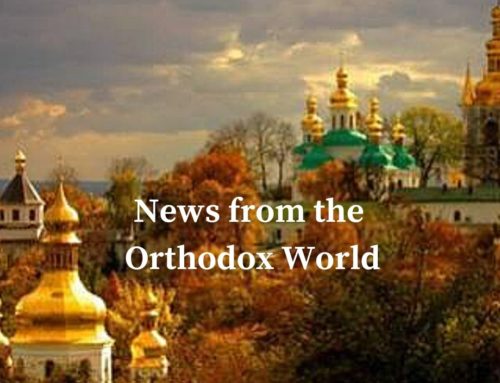Peter Anderson reports from the Orthodox world.
Longstanding reporter of the news from the Eastern Church, Peter Anderson shares our dream of a unified Christianity. His love for Orthodoxy has driven him to this personal mission to share the news of East with the world through his email list. The Urbi et Orbi Foundation is proud to share his efforts and his insights with you.

The annual Assembly of the diocesan bishops of the Serbian Orthodox Church is continuing in Belgrade. Prior to the beginning of the Assembly on Monday, there were comments in the media on how tranquil the situation was under the leadership of recently-elected Patriarch Porfirije, compared to prior years when there were sensational media reports of divisions among the bishops. https://www.politika.rs/scc/clanak/479635/Sabor-SPC-o-kanonskom-poretku-u-SAD-i-situaciji-u-Crnoj-Gori Until Thursday night, May 27, there were no reports as to what was happening in the meeting, with everyone one waiting for the final press release at the end of the meeting (probably next week) to learn what happened. However, last Thursday night, there was a surprising notice that was posted on the official website of the Serbian Patriarchate. https://www.spc.rs/eng/serbian_patriarch_porfirije_continues_fight_rights_serbian_orthodox_church_and_faithful_people_monte (official English translation).
The notice stated that on Thursday morning, representatives of the Montenegro government and representatives of the Holy Synod of the Serbian Patriarchate had reached final agreement on the text of the Basic Agreement governing relations between the Serbian Patriarchate and the State of Montenegro. Previously, there has never been such an agreement. According to the notice, the representatives of Montenegro (apparently the negotiators) and the “Cabinet of the Prime Minister” confirmed that Montenegrin Prime Minister Zdravko Krivokapić would travel to Belgrade later Thursday afternoon, meet with Patriarch Porfirije, and sign the Basic Agreement. After giving various reasons for delay, Krivokapić arrived at the meeting with the Patriarch at 9 p.m. and then “ presented new and previously unspoken reasons why he believes that the signing of the Agreement must be postponed.” The notice did not specify the reasons, but stated that Patriarch Porfirije was “unable to see in the least the merits and justification for Prime Minister Krivokapić’s intention not to sign the agreement.”
After the meeting, Krivokapić stated on his Twitter page: “I proposed that the basic agreement with the Serbian Orthodox Church be signed in Cetinje, on October 30, on the day of the death of Metropolitan Amfilohije” and “I came to Belgrade, to the Patriarchate of the Serbian Orthodox Church, to convey to His Holiness the greetings of the faithful people and their will to see Bishop Joanikije on the throne of St. Peter of Cetinje [namely, filling the vacancy resulting from the death of Metropolitan Amfilohije of Montenegro].” https://twitter.com/profKrivokapic On Thursday evening, Krivokapić’s office confirmed to the Serbian news agency Tanjug that he had come to Belgrade to convey the will of the Montenegrin people that Bishop Joanikije (Mićović) of Budva-Nikšić (presently administering the church in Montenegro) be elected Metropolitan of Montenegro and that the Basic Agreement be signed on October 30. https://www.politika.rs/scc/clanak/479979/Krivokapic-u-Beogradu-kod-patrijarha-Temeljni-ugovor-sa-SPC-tek-u-oktobru Although the postponing of the signing was not linked to the election of Joanikije, I would suspect that the Assembly might fear that Krivokapić was holding the signing of the Agreement hostage to put pressure on the Assembly to elect Joanikije. Bishop Joanikije has now informed the media that he demands that Krivokapić fulfil his promise to sign the Agreement and not to interfere with the election of a new metropolitan for Montenegro. https://www.cdm.me/politika/joanikije-zahtijevao-sam-od-krivokapica-samo-da-potpise-temeljni-ugovor-a-ne-da-se-mijesa-u-izbor-mitropolita/ On the evening of May 28, Krivokapić posted an open letter seeking to justify his actions. The full text can be read at https://www.cdm.me/politika/krivokapic-ucjenjivao-me-df-andrija-mandic-trazio-da-se-izbor-mitropolita-odgodi-do-rekonstrukcije-vlade/ . He states that he has the “greatest duty to fight” for what Metropolitan Amfilohije defended.
There is a report in the media that Bishop Irinej of Bačka, whom Patriarch Porfirije considers to be his “spiritual father,” has proposed postponing until the fall the election of a new metropolitan of Montenegro and that Bishop Irinej is not backing Joanikije, but Bishop David of Kruševac. https://srbin.info/pocetna/aktuelno/napeto-bulovic-od-porfirija-trazi-da-odlozi-izbor-joanikija/ Joanikije was born and raised in Montenegro and has spent most of his life there. It appears that Bishop David has no roots in Montenegro. The following article gives some interesting background information on the opposition of Irinej to Joanikije and also mentions the tensions that previously existed between Irinej and Metropolitan Amfilohije. https://nova.rs/svet/temeljni-ugovor-desavanja-na-relaciji-podgorica-beograd/ What may be at issue is how much independence should be given to the Montenegro church within the Serbian Patriarchate. Joanikije may mean more independence and David less.
After following the events in Montenegro for over a year, the following are my conclusions. Krivokapić is a very religious member of the Serbian Orthodox Church and also a devoted disciple of Metropolitan Amfilohije. He was also an extremely strong opponent to the very controversial law on religion. He is not a professional politician, but was a professor of engineering until Metropolitan Amfilohije encouraged him to head the opposition Future of Montenegro coalition prior to the August 30, 2020 parliamentary elections in Montenegro. The opposition coalitions, namely the Future of Montenegro and also the smaller Peace is Our Nation coalition (headed by Aleksa Bečić) and In Black and White coalition (headed by Dritan Abazović), won the election and enjoy a very narrow 41 to 40 majority in parliament. Largely due to the influence of Metropolitan Amfilohije, Krivokapić was chosen to head the new government as prime minister. Much to the frustration of the large pro-Serbian party of his Future of Montenegro coalition, namely the Democratic Front, Krivokapić has pursued a middle course for an independent Montenegro with a pro-Western orientation.
Krivokapić has strongly supported the created of a Basic Agreement governing the relations between the Serbian Patriarchate and the government of Montenegro. When final agreement was reached on the Basic Agreement on Thursday morning, the Patriarchate, which was apparently very pleased with the agreement, wanted the agreement signed by Krivokapić that very same day. Perhaps they were worried about the political situation in Montenegro and wanted the Agreement signed before any political changes could occur. Krivokapić’s representatives agreed that he would fly to Belgrade that day, but it appears that when Abazović and Bečić were informed, they objected to the Agreement being signed in Belgrade rather than in Montenegro. Admittedly, from the public perception, it would seem strange for Krivokapić to fly suddenly to Belgrade, without any prior public announcement, and sign in a foreign country an agreement relating to church relations in Montenegro. This apparently led Krivokapić suddenly to change his mind and to insist on the formal signing at a later time in Montenegro. The signing ceremony in Montenegro could also involve an important visit by Patriarch Porfirije to Montenegro. With respect to the remarks by Krivokapić expressing the Montenegrin people’s preference for Joanikije, it appears that this may have been the result of sudden scare experienced by Krivokapić and others in Montenegro that Joanikije might not be elected due to the influence of Bishop Irinej at the Assembly. Previously, it was reported by the media that Patriarch Porfirije had expressed to some bishops support for Joanikije and that the election of Joanikije was almost certain. Although it can be well argued that this expression of preference by Krivokapić at the time the Assembly was deliberating was imprudent, Krivokapić probably believes that he was fulfilling the desires of Metropolitan Amfilohije. One must now wait to see what the Assembly will do. A critical question is whether Porfirije will support a choice contrary to the views of his spiritual father Irinej.
On May 19, a delegation of the UOC-MP, headed by Metropolitan Anthony of Boryspil, arrived in Belgrade and met with Patriarch Porfirije. https://news.church.ua/2021/05/19/keruyuchij-spravami-upc-zustrivsya-z-patriarxom-serbskim-porfirijem-v-bjelgradi/ This meeting, held only a few days before the beginning of the Assembly, obviously provided an opportunity for the UOC-MP to argue its case to the new Patriarch just before the beginning of the Assembly. The Serbian Patriarchate has previously issued very strong statements (stronger than any other Local Church aside from Moscow) in favor of the UOC-MP and against the OCA. See https://www.spc.rs/eng/position_serbian_orthodox_church_church_crisis_ukraine and https://www.spc.rs/eng/communique_holy_assembly_bishops_2 (statement by Assembly in May 2019). Patriarch Porfirije agreed to do a short video expressing support for the UOC-MP. The video and the text of the remarks can be seen at https://news.church.ua/2021/05/20/serbskij-patriarx-nasha-cerkva-bude-pidtrimuvati-upc-na-choli-z-mitropolitom-onufrijem-video/ In the video, the Patriarch expresses support for canonical order and UOC-MP. However, compared to the prior statements by the Serbian Patriarchate on the subject, his statement is relatively mild and does not refer to either the OCU or to the Ecumenical Patriarch. To me, it seems consistent with the desire of Porfirije to “blunt blades” in conflicts.
The Moscow Patriarchate’s Department of External Church Relations (DECR) celebrated this month its 75th anniversary. Congratulations were received from many, including President Putin. https://www.kremlin.ru/events/president/letters/65608 In connection with the anniversary, Metropolitan Hilarion gave an interview. https://mospat.ru/en/news/87328/ With respect to the work of the DECR with other confessions, Metropolitan Hilarion stressed primarily aid to the people and churches of Syria. No mention was made of seeking Christian unity – a subject that would displease conservatives.
On May 21, Sergei Lavrov, Foreign Minister of the Russian Federation, addressed the educational marathon “New Knowledge.” https://www.mid.ru/ru/foreign_policy/news/-/asset_publisher/cKNonkJE02Bw/content/id/4741032 In response to a question, Lavrov stated:
The Russian Foreign Ministry works closely with the ROC, primarily with the Department for External Church Relations. We have many projects. This is especially important in conditions when not only the Russian Orthodox Church, but also Orthodoxy as a whole is undergoing a real attack. Our American colleagues under Donald Trump have created the position of special envoy on freedom of religion. He is engaged in exactly the fact that he is trying to split the unity of Orthodox peoples and churches. In Ukraine, for this they use the Patriarch of Constantinople, an absolutely dependent person. It is already clear that this is an instrument in the hands of those who want to undermine the position of Orthodoxy. They are destroying the Serbian Orthodox Church, its canonical territory, trying to extract Lebanon from under the Antiochian Patriarchate. This is all sad. In Russia, the state does not interfere in the affairs of the church. But when other countries interfere in the affairs of the ROC and its sisters in the Orthodox world, the state is already obliged to protect the interests of its fellow believers and like-minded people.
The next day, Metropolitan Hilarion, on his television program Church and the World, made similar comments. https://ria.ru/20210522/rpts-1733464951.html; https://mospat.ru/en/news/87345/ He stated:
And certainly, the fact that the US secretary of state met with the schism leader but did not meet either with the head of the canonical Church or Muslim or Judaic religious leaders shows for the umpteenth time that the “OCU” is a project of the USA, a political project from beginning to end. This is not something that was born in the depths of church life – this is something that was created by the Americans in order to once again embody the principle by which they are guided: “divide and rule.” … Thus the division that had already happened on the political level happened on the church level as well, and the person who implemented this American plan was Patriarch Bartholomew of Constantinople. His dependence on America is quite obvious and a common knowledge; as a matter of fact, nobody hides it.”
In an action of great significance, Pope Francis postponed for one year the Synod of Bishops assembly devoted to the topic, “For a synodal Church: communion, participation and mission.” https://press.vatican.va/content/salastampa/it/bollettino/pubblico/2021/05/21/0314/00693.html#en The postponement allows for consultations on the topic by each diocese, then by each episcopal conference, then by each continent, and then finally by the Synod of Bishops meeting at the Vatican in October 2023. The diocesan phase includes “listening to all of the baptized.” This is consistent with the vision of the Church presented by Pope Francis in his address to the Synod of Bishops on October 17, 2015. https://www.vatican.va/content/francesco/en/speeches/2015/october/documents/papa-francesco_20151017_50-anniversario-sinodo.html In his vision, the Church should be like “an inverted pyramid” where the top is located beneath the base.” It is a “listening process” where the Pope acts “not on the basis of his personal convictions but as the supreme witness to the fides totius Ecclesiae.” The Pope also noted at that time that the “commitment to build a synodal Church…has significant ecumenical implications.” In the first year of his pontificate (2013), Pope Francis in his apostolic exhortation Evangelii Gaudium stated that “in the dialogue with our Orthodox brothers and sisters, we Catholics have the opportunity to learn more about the meaning of episcopal collegiality and their experience of synodality.” https://www.vatican.va/content/francesco/en/apost_exhortations/documents/papa-francesco_esortazione-ap_20131124_evangelii-gaudium.html (para. 246) In my opinion, the lessons learned by Pope Francis from Orthodoxy may be responsible, at least in part, for this major change of course by the Catholic Church toward synodality.
In other news, the Synodal Commission on Inter-Christian Relations of the OCU, with the approval of Metropolitan Epifany, has issued a statement on the “75th anniversary of the so-called Lviv Sobor of 1946.” https://www.pomisna.info/uk/vsi-novyny/zayava-z-nagody-75-littya-vid-chasu-provedennya-tak-zvanogo-lvivskogo-soboru-1946-roku/ According to the statement, the Lviv Sobor was not a true council but was organized by “Stalinist regime in 1946 for political purposes.” The statement acknowledges that the preceding “four centuries of history are filled with bitter events, deeds for which Orthodox and Greek Catholics must apologize to each other.” Metropolitan Emmanuel (Ecumenical Patriarchate) was in Kyiv this week to work on the details of the Ecumenical Patriarch’s planned visit to Kyiv in August. https://www.president.gov.ua/en/news/ukrayina-sogodni-ye-krayinoyu-mizhkonfesijnogo-miru-ta-z-net-68681 The presidents of both Bulgaria and North Macedonia with their respective delegations were both in Rome this week for the feast of Saints Cyril and Methodius. The following is a short video of the Pope meeting with the delegation from North Macedonia. https://www.youtube.com/watch?v=IGEh87BPpys If you look carefully, you can see that the Pope still has on his desk a photo of his meeting with Ecumenical Patriarch Bartholomew. The same photo was there in a video posted in April 2020. https://www.youtube.com/watch?v=hrJ6mg3vZrA In this week’s video, one can see the Pope talking to Metropolitan Pimen of the European Diocese of the schismatic Macedonian Orthodox Church. Obviously, the Pope does not control whom the President of North Macedonia includes in his delegation. However, significantly, no one from the Catholic Church was present when the North Macedonian delegation held a service at the grave of St. Cyril, but Cardinal Koch was present when the Bulgarian delegation held its service there. https://www.christianunity.va/content/unitacristiani/en/news/2021/2021-05-27-salut-cardinal-koch-saints-cyrille-et-methode.html
Peter Anderson, Seattle USA


